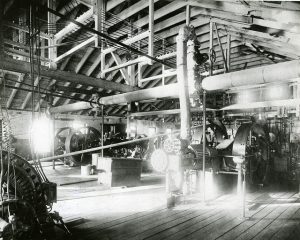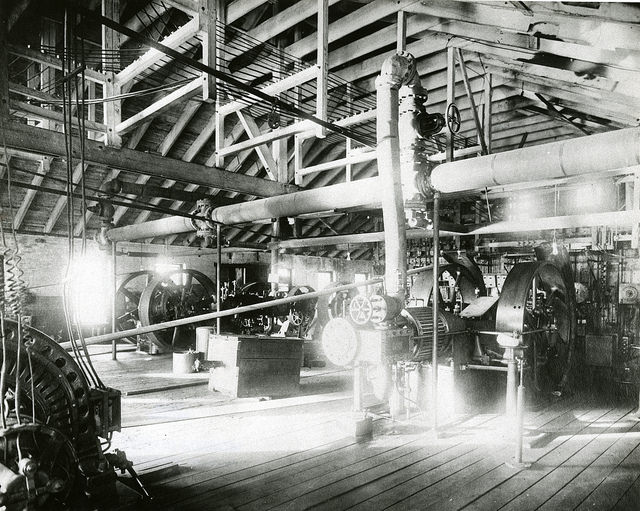Diesel plant renovation granted to local historical society
BY PRU SOWERS
KONK LIFE STAFF WRITER

Power Plant in-operational times
There was only one organization that applied to take over the city-owned former Keys Energy diesel plant in Bahama Village but it was a pretty good one.
The Key West Art & Historical Society (KWAHS) was granted permission by city officials to stabilize and renovate the abandoned former electrical generation plant. Key West City Commissioners, sitting as the Caroline Street Corridor and Bahama Village Community Redevelopment Agency, voted unanimously to give the Society a 20-year lease to the property at no cost.
In return, KWAHS, which has helped renovate three other local historic structures including the Customs House, will pay to stabilize the dilapidated buildings and renovate them into a museum, multipurpose space for events and a restaurant and microbrewery. The Society proposal said it will collaborate with a local restaurateur and bar operator on this part of the operation. The project will be called the Discovery, Industry, Engineering, Science, Experience and Learning Plant, or D.I.E.S.E.L. for short.
“Our plan is to convert the buildings into a mixed use, cultural facility that includes an interactive museum that spans at least three of the buildings that includes a microbrewery, a restaurant and a project visual gallery,” said Michael Gieda, KWAHS Executive Director.
The Society will pay for the entire unspecified cost of the renovation and will manage the facility. Based on its proposal, KWAHS projected annual revenues at $2.15 million once the facility is up and running and expenses at $1.7 million, leaving an estimated $450,000 profit to the Society each year.
The project would take eight to 10 years to complete and be done in three phases: the first to negotiate the 20-year lease and stabilize the building, including replacing the roof. Phase 2 will finalize the building design and budget. Phase 3 will secure final funding and begin construction. KWAHS said it will hire a new development director whose primary responsibility will be to raise money for the project.
Built in the 1880’s, the historic diesel plant ceased operations in the 1970’s. Empty and slowly crumbling since then, Keys Energy Services offered it for free to the city and voters approved the transfer in a 2016 ballot referendum. A 2018 report by the city’s building officer recommended demolishing three of the five buildings on the site because of unsafe conditions. But fearful of losing an historic part of Bahama Village, several residents began complaining and asked that the Key West Historic Architectural Review Commission (HARC) should be allowed to weigh in on the decision. Commissioners agreed, sending the matter to HARC for consideration. The review commission then held a public meeting and developed recommendations on how the structure could be saved. A request for proposals was put out in September last year and the only organization to respond was KWAHS.
“We think this is a classic case of where the process has worked,” said HARC Chair Bryan Green about the review steps taken that saved the plant.
Part of the design proposal includes demolishing one of the smaller out-buildings that currently extends over Fort Street. The removal of the building will allow for a pedestrian walkway between Fort and Angela streets.
“The removal of one of the buildings currently on the site will open access to Fort Street. This will benefit the Bahama Village neighborhood and provide residents with better access to Truman Waterfront Park. The rehabilitation of the remaining buildings will greatly increase safety and security in the area, as well as creating a more attractive visual landscape,” the KWAHS proposal read.
In addition to the Customs House, the KWAHS renovated and operates the Fort East Martello on South Roosevelt Boulevard and the Key West Lighthouse and Keeper’s Quarters on Whitehead Street.
“[B]y the renovation of the historic Diesel Plant we are preserving and taking social responsibility of protecting an endangered resource with a significant past in our history and bringing it back, with a new use, to be enjoyed by future generations and us,” according to the KWAHS proposal.
The interactive museum will operate 364 days a year from 9:30 a.m.-4:30 p.m. Admission rates will be $15 for adults, $5 for children and free admission for all Monroe County students.
[livemarket market_name="KONK Life LiveMarket" limit=3 category=“” show_signup=0 show_more=0]

No Comment